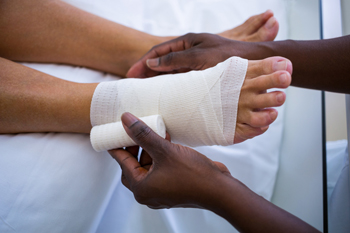
Puncture wounds on the feet are caused by injuries to the feet from pointed objects. Such wounds are usually caused by stepping on a sharp object, such as a nail or piece of glass. Penetration is usually deeper if it is on a weight-bearing area of the foot. An infection can quickly develop from such a wound and must be tended to in a timely manner. If you have sustained a puncture wound, the first thing to do is wash your hands and examine the wound to see how deep it is. If the object grazed the skin and it was not rusty or dirty, the scratch should be gently cleaned with soap and water. A minor wound can then be covered with a bandage and checked frequently. If it is deeper, the object is still in the foot, or dirt from the pointed object has entered the wound, it is important to seek treatment immediately. It is suggested that if you have sustained such an injury, you make an appointment with a podiatrist as soon as possible to have the wound checked, tetanus shots updated, and treatment given.
Wound care is an important part in dealing with diabetes. If you have diabetes and a foot wound or would like more information about wound care for diabetics, consult with Dr. Mark Gagnon from Advanced Podiatry. Our doctor will assess your condition and provide you with quality foot and ankle treatment.
What Is Wound Care?
Wound care is the practice of taking proper care of a wound. This can range from the smallest to the largest of wounds. While everyone can benefit from proper wound care, it is much more important for diabetics. Diabetics often suffer from poor blood circulation which causes wounds to heal much slower than they would in a non-diabetic.
What Is the Importance of Wound Care?
While it may not seem apparent with small ulcers on the foot, for diabetics, any size ulcer can become infected. Diabetics often also suffer from neuropathy, or nerve loss. This means they might not even feel when they have an ulcer on their foot. If the wound becomes severely infected, amputation may be necessary. Therefore, it is of the upmost importance to properly care for any and all foot wounds.
How to Care for Wounds
The best way to care for foot wounds is to prevent them. For diabetics, this means daily inspections of the feet for any signs of abnormalities or ulcers. It is also recommended to see a podiatrist several times a year for a foot inspection. If you do have an ulcer, run the wound under water to clear dirt from the wound; then apply antibiotic ointment to the wound and cover with a bandage. Bandages should be changed daily and keeping pressure off the wound is smart. It is advised to see a podiatrist, who can keep an eye on it.
If you have any questions, please feel free to contact one of our offices located in Crestwood, Orland Park, and Summit, IL . We offer the newest diagnostic and treatment technologies for all your foot care needs.
